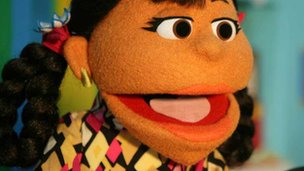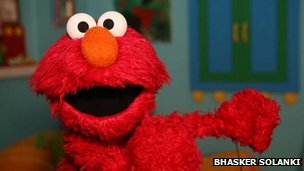8wid
Sidekick
- Joined
- Aug 2, 2008
- Messages
- 4,166
- Reaction score
- 0
- Points
- 31
Puppet power as Sesame Street arrives in Lahore
In the fight against extremism in nuclear-armed Pakistan, the United States is deploying a new weapon - Elmo.
The lovable red monster is about to hit TV screens here in a locally produced version of one of America's most potent exports - Sesame Street. There are local productions in 20 countries, from China to Palestine.
The Pakistani programme, Sim Sim Hamara, has not come cheap.
The United States Agency for International Development, USAID, has committed $10m (7.4m euros, £6.3m) to the four-year project. The final figure could be twice that. It is a major investment in a troubled nation, where the only education on offer for some is in radical madrassas.
The US government is hoping that as well as providing basic literacy and numeracy skills, the programme will teach lessons in tolerance, and mutual respect.
On set in Lahore, the producers, the Rafi Peer Theatre Workshop, insisted that while Washington funded the series, it did not write the script.
Pig-tailed puppet
The finance came with no strings attached, according to Faizan Peerzada, the theatre group's chief executive officer.
"I think I really respect the American taxpayer that at this critical time they have invested this money for the children of Pakistan, and without any prerequisites," he said.
Continue reading the main story RANI THE PUPPET

Rani is a six-year-old on a quest for knowledge, with a magnifying glass at the ready.
This farmer's daughter with flowers in her hair has a love of nature and a garden of her own.
She is sporty, and fond of Pakistani traditional music but her defining characteristic is her hungry mind.
She has an endless supply of questions, according to Yamina Peerzada, the puppeteer who plays her.
"She's this over-enthusiastic child, who always wants to know everything. She's out-there, and confident."
Rani's creators say she is over-enthusiastic, and unstoppable, deliberately so.
"She's very much at the top of things," says the show's head writer Imran Peerzada.
"We wanted to show her taking the lead."
"The only requisite is to make a beautiful programme, so our children can get inspired."
Elmo's new home is a Pakistani village, complete with tea-stall and shady Banyan tree. Big Bird has not made the journey, so he is surrounded by new friends. There is Baily the donkey - who wants to be a pop star - and a vain crocodile called Haseen O'Jameel, who dwells at the bottom of a well.
The star of the show is Rani, a pig-tailed puppet, who is cricket-mad, energetic and curious.
The creators hope this strong female lead will send a message to the next generation in this conservative society - especially the girls.
"A lot of girls here are shy," says Yamina Peerzada, the animated young actress who is voice of Rani.
"Maybe seeing Rani - that's she's really strong-headed, and she's the captain of the cricket team and she's not afraid to ask questions - I'm hoping the children will relate to that, and kind of take some courage, and just love her for that."
For answers to her many questions, Rani often turns to a human playmate Kiran, the daughter of the village schoolteacher. Saleha Majeed, the 12-year-old who plays Kiran, says the puppets are like family.
"I feel like they are my younger brothers and sisters, 'cos I am telling them a lot of stuff, and they are learning from me."
She thinks the show's young viewers will learn a lot too - more than if they go to school.
Many Pakistani children never get inside a classroom. One third of primary school-age children in the country are not in class and so this programme may be their only teacher.
"This is not building a school," says Faizan Peerzada, "this is reaching them with a school. It will be an informal, joyful learning process."
The aim is to reach children across Pakistan. The ABC will be in Urdu and the languages of Pakistan's provinces, which will have their own episodes. The cast includes characters with different skin tones - light and dark - to reflect regional diversity.
Colourful window
The programme will also include holidays marked by different religions - a display of mutual respect in a country where minority religions often come under attack.
But the content will be tailored to the target audience, of four- to eight-year-olds.
Elmo is one of the cast of characters in the Pakistani edition - but not Big Bird
"The child has to share a piece of bread with the other, and he has to play with the same toy," said Faizan Peerzada. "That's the tolerance we are talking about, and that tolerance will lead to all levels of tolerance."
The show is a collaboration with the founders of Sesame Street, the US Sesame Workshop. But they stress their involvement was limited to advice and support.
"This is a project being created by Pakistani people, for Pakistani children," said Charlotte Cole, of the Sesame Workshop. "Our hope is that it will be seen as a gift to children, something that is Pakistan's own."
The programme - and its American funding - may not go down well with everyone here - many Pakistanis see the US as an enemy, rather than an ally.
The makers of Sim Sim Hamara know the risks of angering the militants. They learnt that in 2008, when there were three bombs in one day at one of their events.
There was no loss of life, and the show went on the next day.
"The biggest Jihad is to be a good human being," said Faizan Peerzada, "to think of your neighbours, and to work for the progress of your community."
He believes that is a lesson the programme can instil in the young minds of Pakistan.
"This is a colourful window that will open to our children," he said "and they deserve it. I'm very hopeful that something as innocent as this should not be targeted."
"We are not receiving threats," he said "at this point in time."


